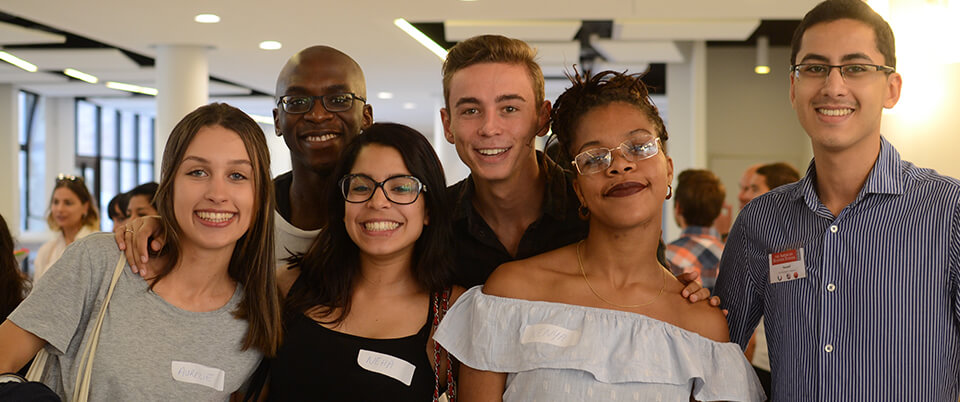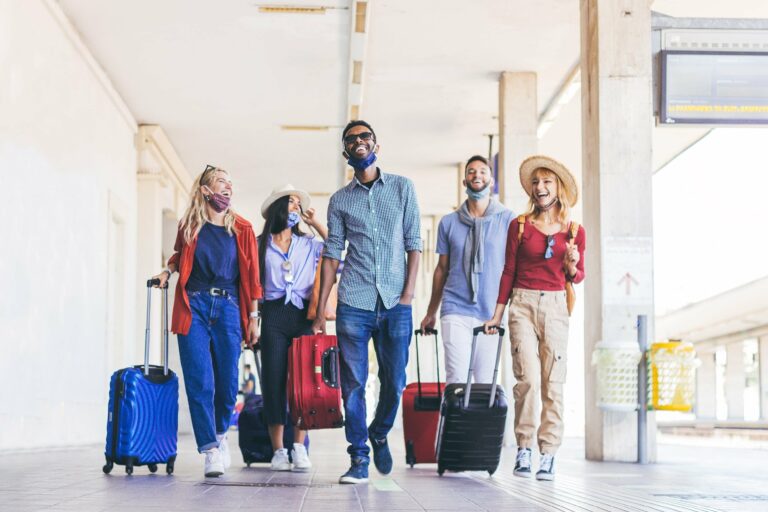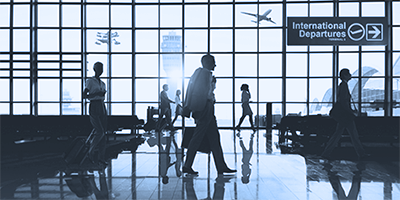Your arrival
This is it! Today is the big day

1. Immigration services, police, customs
For a serene arrival:
- Prepare a completed file with the following documents and a copy: passport, visa – if necessary, your sanitary pass, any other document that can be required in some countries.
- Verify on the French embassy’s website if you must fill in specific forms or other documents (Ex: Form F1 for the United States)
- Respect the law: it is forbidden to go accross customs with some goods: drugs, counterfeits, animal and vegetal species which trade is governed by the Convention on International Trade for Endangered Species of Wild Fauna and Flora (CITES).
You can refer to the website: https://www.economie.gouv.fr/particuliers/regles-douane-frontiere - Answer questions politely.
It is very rare that a country denies its access if you correctly made all administrative procedures and respect laws and rules in application, but nothing is automatic.
2. Withdraw money
Withdrawing local money with your bank card at the airport when you arrive. This is the best option to be serene and avoid high exchange fees.
3. Your transfer from the airport
Your hosting university will provide you with some information on how to reach the campus or how to reach your accommodation. Make sure you have all necessary information with you for a serene arrival and if you need to use public transportation or taxis, make sure you know about prices and itineraries.
4. Orientation program
Most of our partner universities offer an orientation program that can last from a few hours to a week. YOU MUST FOLLOW THE ORIENTATION PROGRAM THAT IS OFFERED TO YOU. Why? In some cases it is compulsory and represents a condition set by authorities for your arrival into the country, such as in the United States.
Then, you will receive essential information to start your stay and your integration in the country, but also in the university an its functioning.
This is also the opportunity to meet other students that also do a study semester abroad.
If registration to lectures are made on your arrival, it will be done at that time.
5. Your accommodation
Before your arrival: Ask all questions regarding accommodation, ask for photos, make sure you can access your accommodation when you arrive and get the contact information of the person who will leave you the keys.
You will find dedicated student accommodation throughout Europe with Erasmus Play or SPACEST. And don’t forget that, if you need to, you can also rent your accommodation during your mobility period with SMART RENTING.
In case of problem (ex: plane delay or other), make sure you have a B plan for your first night on site with details of one or two hotels/hostels.
According to the destination, bed sheets may not be provided. You may better buy them on place because it is heavy and therefore expensive to travel with. Also, size and type of bedding standards vary accross countries. Same for dishware, etc.
6. Flatshare: define rules together
If you share a flat with people you do not know, define some living rules together: can we smoke, allow a friend to spend a night in the bedroom? What are the rules regarding dishwashing? etc.
7. Insurances
Check if the flat is actually covered by an insurance. Same advice regarding car motorbike or bicycle rental.
8. Academic adaptation
Most of our partners offer an Anglo-Saxon way of teaching. You may have less class hours but much more homework.
Teachers will provide you with a detailed course syllabus, session by session with everything necessary for each one: topics to be discussed, work to provide, mid-term exams, final exams and more important, what you need to do to prepare the lectures.
Some teachers will do some surprise MCQs to check if you actually studied the chapter or article they asked you to read to prepare the lecture.
The lecture plan, also called “syllabus” will also indicate how the final grade will be composed. Example : 30% for the final exam, 20% for 4 surprise MCQs, 15% for a mid-term exam, 20% for a report and 15% for your participation in class.
Your presence during the lecture is obviously compulsory. Some universities or teachers will explain that if you miss more than 2 sessions, the lecture will automatically be considered as failed. If it happens to you, try to negotiate for an additional work to compensate with your absences.

9. Your safety
During your trip, take care of your belongings. Depending on countries, airports are more or less safe places and in some of them, it can be easier to get your luggage or bag robbed. Always be careful if you are on the phone or when you check time panels and keep an eye on your belongings.
It is possible that during your orientation program, locals explain to you how to behave or which neighbourhoods to avoid. If not, ask for these information but in general, follow the following recommendations.
During your daily life if you go to crowded places – public transportation stations, shopping streets, touristic sights- beware of pickpockets.
Avoid letting valuables belongings be seen, either with you during your travels or in your accommodation. Beware of what you may not consider valuable can be for people in other countries.
During your trips, if you rent a room, check that you can lock the door while you are not there or when you sleep.
If you plan a trip, share your itinerary with a friend not taking part of it.
NEVER CARRY YOUR PASSPORT BUT ONLY A COPY. Keep your passport in a safe place.
10. Manage your budget
Your budget will be more or less important, depending on the country. Split the budget you planned according to the number of weeks and try to stick to it.
If you plan on travelling accross the country, prepare yourself in advance and book transport tickets as soon as possible to get better prices. Talk about it with local students, as they may have some tips for you.
11. Stay in contact
In case of concern, serious problem, accident or other, you can contact your school of Groupe IGENSIA Education. Keep regular contact with your family and friends, send your travel itineraries to your relatives to contact you if necessary.
Beware of calls from abroad to France which are often surcharged. Always prefer solutions via internet.





